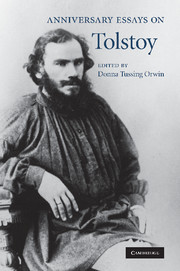Book contents
- Frontmatter
- Contents
- Acknowledgments
- List of contributors
- Introduction
- 1 Tolstoy and music
- 2 Sublime vision and self-derision: the aesthetics of death in Tolstoy
- 3 Tolstoy's peaceable kingdom
- 4 Leo Tolstoy: pacifist, patriot, and molodets
- 5 Leo Tolstoy's correspondence with Nikolai Strakhov: the dialogue on faith
- 6 The worm of doubt: Prince Andrei's death and Russian spiritual awakening of the 1860s
- 7 Tolstoy's spirituality
- 8 Tracking the English novel in Anna Karenina: who wrote the English novel that Anna reads?
- 9 Violence and the role of drama in the late Tolstoy: The Realm of Darkness
- 10 What men quote by: Tolstoy, wise sayings, and moral tales
- 11 The “proletarian lord”: Leo Tolstoy's image during the Russian revolutionary period
- Bibliography
- Index
5 - Leo Tolstoy's correspondence with Nikolai Strakhov: the dialogue on faith
Published online by Cambridge University Press: 03 May 2010
- Frontmatter
- Contents
- Acknowledgments
- List of contributors
- Introduction
- 1 Tolstoy and music
- 2 Sublime vision and self-derision: the aesthetics of death in Tolstoy
- 3 Tolstoy's peaceable kingdom
- 4 Leo Tolstoy: pacifist, patriot, and molodets
- 5 Leo Tolstoy's correspondence with Nikolai Strakhov: the dialogue on faith
- 6 The worm of doubt: Prince Andrei's death and Russian spiritual awakening of the 1860s
- 7 Tolstoy's spirituality
- 8 Tracking the English novel in Anna Karenina: who wrote the English novel that Anna reads?
- 9 Violence and the role of drama in the late Tolstoy: The Realm of Darkness
- 10 What men quote by: Tolstoy, wise sayings, and moral tales
- 11 The “proletarian lord”: Leo Tolstoy's image during the Russian revolutionary period
- Bibliography
- Index
Summary
ABOUT THE CORRESPONDENCE
Among Leo Tolstoy's voluminous letters, his correspondence with Nikolai Strakhov stands out for its intensity, intimacy, reciprocity, and confessional nature. As a literary critic and philosophical writer, Nikolai Nikolaevich Strakhov (1828–96) participated in the major intellectual debates and publishing ventures of the 1860s–80s. In his prodigious role as editor, private correspondent, and confidant, he served as a conveyor of diverse ideas and a mediator between disparate people. (In many ways, he served as a “link” between Tolstoy and Dostoevsky.) What Strakhov self-consciously offered to Tolstoy was his special ability, and need, to “enter other people's interests and thoughts” (1: 207; April 22, 1875). Tolstoy insisted on reciprocating. At his urging, in spring 1875 (after four years of friendship), Strakhov confessed that he had been desperately searching for a “cause” in life (1: 207). Tolstoy wanted to probe the matter further: “Your spiritual condition has been revealed to me a little, and I want all the more to penetrate it further” (1: 211; May 5, 1875). He suspected that they were both yearning for faith. Thus, Strakhov admitted to the same desire that Tolstoy himself had experienced as of late: to visit Optina Pustyn' – a monastery and hermitage celebrated for its elders (startsy), charismatic Orthodox spiritual advisers eager to advise laymen and even hear their informal (non-sacramental) confessions (1: 211). (For the next two years they would plan and discuss a visit to Optina, which took place only in July 1877.)
- Type
- Chapter
- Information
- Anniversary Essays on Tolstoy , pp. 96 - 119Publisher: Cambridge University PressPrint publication year: 2010
- 1
- Cited by

